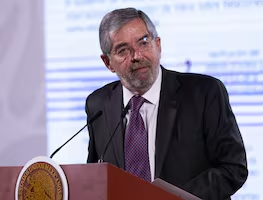Más Información

Posibles deportaciones masivas requieren acciones inmediatas: PRI; reducción de presupuesto del INM agrava situación

Diputada de MC propone despenalizar sustancias psicoactivas; cobrar impuestos al mercado de drogas recaudaría más de 1 bdp, calcula

Analizan reunión de cancilleres para enero; buscan coordinar estrategias antes posibles deportaciones masivas

Sheinbaum: se trabaja para que migrantes puedan acceder a programas del bienestar; colaboran Segob y consulados
Following a controversy over the recruitment of two assistant directors at Mexico’s National Council of Science and Technology (CONACYT) who lacked administrative experience and scientific background, as well as a statement by the Mexican Academy of Sciences claiming that they would be forced to suspend their activities due to a lack of funding from CONACYT, the government body announced an investment that will allegedly be four times larger than before on projects related to basic science.
Through a press release, the CONACYT announced that “in order to make up for deficiencies caused by a lack of support for the development of basic science in the past few years, we have decided to appoint a special budget for the rescue of 508 projects that are ‘highly recommended,’ though they had been left without funds earlier this year.”
According to CONACYT, this investment will represent a larger amount than the one appointed in 2017 and 2018 , though the government body did not give figures.
“Border science (also known as basic science) is of utmost importance for the development of new technologies that could benefit our country while reducing our technological dependence,” stated the press release.
Reforming CONACYT
On February 8th , without the consensus of the scientific community, MORENA senator Ana Lilia Rivera presented an initiative before Congress for the creation of the Law of Humanities, Science, and Technology , which aims to reform the CONACYT, turning it into the National Council of Humanities, Science, and Technology (CONAHCYT) while centralizing decision making with regard to the country’s scientific policies.
The document presented by Lilia Rivera –albeit she is not a member of the National Commission of Science and Technology nor does she have any experience in these fields- proposed to dissolve all seven collegiate bodies that influence scientific policies : The Inter-Ministerial Commission for Bio-security and Genetically Modified Organisms, the National Network of Scientific Groups and Research Centers, the National Science Conference, the General Council of Scientific Research, the Advisory Council of Sciences, the Coordination of Science, Technology, and Innovation at the President’s Office, and the Consultative Forum of Science and Technology (FCCyT) .
Without said bodies, the CONAHCYT would be in full control of decision making regarding science and technology in the country. “The CONAHCYT would become the only consultative body available to advise all powers of the federation with regard to knowledge generation,” states a press release by the FCCyT, through which the consultative body expressed their support for the initiative.
Members of Mexico’s scientific community spoke out against the initiative in social media, arguing that the reform would pose a threat to freedom of research. Yesterday, the CONACYT vowed to convene forums for the elaboration of new proposals surrounding the country’s public policies on science and technology.
dm







